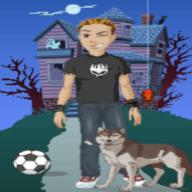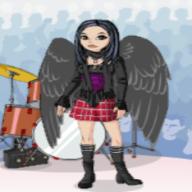Halloween的來源是什麼???
請打英文!!!!!
Halloween的來源是......急!!!!!
2006-10-30 7:56 am
回答 (5)
2006-10-30 8:09 am
✔ 最佳答案
The word itself, "Halloween," actually has its origins in the Catholic Church. It comes from a contracted corruption of All Hallows Eve. November 1, "All Hollows Day" (or "All Saints Day"), is a Catholic day of observance in honor of saints. But, in the 5th century BC, in Celtic Ireland, summer officially ended on October 31. The holiday was called Samhain (sow-en), the Celtic New year. One story says that, on that day, the disembodied spirits of all those who had died throughout the preceding year would come back in search of living bodies to possess for the next year. It was believed to be their only hope for the afterlife. The Celts believed all laws of space and time were suspended during this time, allowing the spirit world to intermingle with the living.
Naturally, the still-living did not want to be possessed. So on the night of October 31, villagers would extinguish the fires in their homes, to make them cold and undesirable. They would then dress up in all manner of ghoulish costumes and noisily paraded around the neighborhood, being as destructive as possible in order to frighten away spirits looking for bodies to possess.
Probably a better explanation of why the Celts extinguished their fires was not to discourage spirit possession, but so that all the Celtic tribes could relight their fires from a common source, the Druidic fire that was kept burning in the Middle of Ireland, at Usinach.
Some accounts tell of how the Celts would burn someone at the stake who was thought to have already been possessed, as sort of a lesson to the spirits. Other accounts of Celtic history debunk these stories as myth.
The Romans adopted the Celtic practices as their own. But in the first century AD, Samhain was assimilated into celebrations of some of the other Roman traditions that took place in October, such as their day to honor Pomona, the Roman goddess of fruit and trees. The symbol of Pomona is the apple, which might explain the origin of our modern tradition of bobbing for apples on Halloween.
The thrust of the practices also changed over time to become more ritualized. As belief in spirit possession waned, the practice of dressing up like hobgoblins, ghosts, and witches took on a more ceremonial role.
2006-10-31 9:46 pm
Halloween is a tradition celebrated on the night of October 31, most notably by children dressing in costumes and going door-to-door collecting sweets. It is celebrated in parts of the Western world, though most commonly in the United States, Canada, the UK, Ireland, Puerto Rico, and with increasing popularity in Australia and New Zealand. Halloween originated among the Celts in Ireland, Britain and France[1] as the Pagan Celtic harvest festival, Samhain. Irish, Scots, Calan Gaeaf in Welsh and other immigrants brought versions of the traditions to North America in the 19th century. Most other Western countries have embraced Halloween as a part of American pop culture in the late 20th century.
The term Halloween, and its older spelling Hallowe'en, is shortened from All-hallow-even, as it is the evening before "All Hallows' Day"[2] (also known as "All Saints' Day"). In Ireland, the name was All Hallows' Eve (often shortened to Hallow Eve), and though seldom used today, it is still a well-accepted label. The holiday was a day of religious festivities in various northern European Pagan traditions, until Pope Gregory III moved the old Christian feast of All Saints Day to November 1 to give Halloween a Christian interpretation . Halloween is also called Pooky Night in some parts of Ireland, presumably named after the púca, a mischievous spirit.
...........
去http://en.wikipedia.org/wiki/Halloween 到看詳細資料。
-----------------------
What I know from Halloween
In the US, American kids always go to trick or treating. They always dressed up as a witch, princess, whatever character they want to. They will be get together with ttheir friends and go to every houses to get candy. Usually people give out chocolate bars, milky way, lifesavers, and other kinds of hard candy & soft candy. In some places (like where I lived), those bad kids will throw those rotten eggs, obviously its not good.
And family will put a pum*****in outside their house
The term Halloween, and its older spelling Hallowe'en, is shortened from All-hallow-even, as it is the evening before "All Hallows' Day"[2] (also known as "All Saints' Day"). In Ireland, the name was All Hallows' Eve (often shortened to Hallow Eve), and though seldom used today, it is still a well-accepted label. The holiday was a day of religious festivities in various northern European Pagan traditions, until Pope Gregory III moved the old Christian feast of All Saints Day to November 1 to give Halloween a Christian interpretation . Halloween is also called Pooky Night in some parts of Ireland, presumably named after the púca, a mischievous spirit.
...........
去http://en.wikipedia.org/wiki/Halloween 到看詳細資料。
-----------------------
What I know from Halloween
In the US, American kids always go to trick or treating. They always dressed up as a witch, princess, whatever character they want to. They will be get together with ttheir friends and go to every houses to get candy. Usually people give out chocolate bars, milky way, lifesavers, and other kinds of hard candy & soft candy. In some places (like where I lived), those bad kids will throw those rotten eggs, obviously its not good.
And family will put a pum*****in outside their house
2006-10-31 5:56 am
About Halloween
by Holly Ruggiero
Traces of Halloween can be found in the ancient Celtic ritual known as Samhain (sow-in). Held on November 1st, the end of harvest and the onset of a cold, bleak winter it began the new cycle of life. This was the start of the Celtic New Year. The night before, October 31st, the boundary between the living world and the afterworld was opened and the dead mingled freely among the living. These spirits were powerful and wise. It was in the 19th century when children began playing pranks and people began to fear these "ghosts" as evil.
In the 800's, Pope Boniface IV created All-hallows from the Middle English, Alholowmesse meaning All Saints' Day to be celebrated on November 1st in an attempt to end Samhain. However, Samhain became known as All Hallows Eve and eventually Halloween.
In the late 1800's, there was a strong effort to change Halloween from a scary, superstitious festival to a family and community holiday. Families held parities for children and scary decorations were abandoned.
The tradition of carving out pumpkins started in Ireland. Originally large turnips, rutabagas, and potatoes were used. Legend tells of an ornery man named Jack, he was a mean man and when he died Heaven turned him away but so did Purgatory because Jack had played terrible tricks on the devil during his life. It was dark and Jack couldn't find his way so the devil tossed him a burning coal, which he promptly put inside a turnip. He was doomed to walk the earth looking for a place to go. He became known as "Jack of the Lantern," or "Jack-o'-lantern." To scare away Jack and other spirits, jack-o'-lanterns are placed outside the front door on the one day where spirits roam the land--Halloween. When immigrants came to the United States they started the tradition of using a pumpkin.
Trick-or-treating originated in England when the poor would beg for food on All Souls' Day. Beggars would receive special treats in exchange for prayers for the dead. In time, children began "begging" for treats on Mischief Night. To avoid tricks, treats were and are given to children.
Today it is popular to have Halloween parties in which guests dress in costumes and eat strangely decorated food. Children go door to door dressed in costumes and receive candy or trinkets. Many people put out decorations and jack-o-lanterns and watch scary movies. There are also many places that host Haunted Houses, even the local sheriffs' stations. More and more shopping malls are hosting a safe Halloween trick-or-treating event for children.
by Holly Ruggiero
Traces of Halloween can be found in the ancient Celtic ritual known as Samhain (sow-in). Held on November 1st, the end of harvest and the onset of a cold, bleak winter it began the new cycle of life. This was the start of the Celtic New Year. The night before, October 31st, the boundary between the living world and the afterworld was opened and the dead mingled freely among the living. These spirits were powerful and wise. It was in the 19th century when children began playing pranks and people began to fear these "ghosts" as evil.
In the 800's, Pope Boniface IV created All-hallows from the Middle English, Alholowmesse meaning All Saints' Day to be celebrated on November 1st in an attempt to end Samhain. However, Samhain became known as All Hallows Eve and eventually Halloween.
In the late 1800's, there was a strong effort to change Halloween from a scary, superstitious festival to a family and community holiday. Families held parities for children and scary decorations were abandoned.
The tradition of carving out pumpkins started in Ireland. Originally large turnips, rutabagas, and potatoes were used. Legend tells of an ornery man named Jack, he was a mean man and when he died Heaven turned him away but so did Purgatory because Jack had played terrible tricks on the devil during his life. It was dark and Jack couldn't find his way so the devil tossed him a burning coal, which he promptly put inside a turnip. He was doomed to walk the earth looking for a place to go. He became known as "Jack of the Lantern," or "Jack-o'-lantern." To scare away Jack and other spirits, jack-o'-lanterns are placed outside the front door on the one day where spirits roam the land--Halloween. When immigrants came to the United States they started the tradition of using a pumpkin.
Trick-or-treating originated in England when the poor would beg for food on All Souls' Day. Beggars would receive special treats in exchange for prayers for the dead. In time, children began "begging" for treats on Mischief Night. To avoid tricks, treats were and are given to children.
Today it is popular to have Halloween parties in which guests dress in costumes and eat strangely decorated food. Children go door to door dressed in costumes and receive candy or trinkets. Many people put out decorations and jack-o-lanterns and watch scary movies. There are also many places that host Haunted Houses, even the local sheriffs' stations. More and more shopping malls are hosting a safe Halloween trick-or-treating event for children.
2006-10-30 6:17 pm
Halloween is a tradition celebrated on the night of October 31, most notably by children dressing in costumes and going door-to-door collecting sweets. It is celebrated in parts of the Western world, though most commonly in the United States, Canada, the UK, Ireland, Puerto Rico, and with increasing popularity in Australia and New Zealand. Halloween originated among the Celts in Ireland, Britain and France[1] as the Pagan Celtic harvest festival, Samhain. Irish, Scots, Calan Gaeaf in Welsh and other immigrants brought versions of the traditions to North America in the 19th century. Most other Western countries have embraced Halloween as a part of American pop culture in the late 20th century.
The term Halloween, and its older spelling Hallowe'en, is shortened from All-hallow-even, as it is the evening before "All Hallows' Day"[2] (also known as "All Saints' Day"). In Ireland, the name was All Hallows' Eve (often shortened to Hallow Eve), and though seldom used today, it is still a well-accepted label. The holiday was a day of religious festivities in various northern European Pagan traditions, until Pope Gregory III moved the old Christian feast of All Saints Day to November 1 to give Halloween a Christian interpretation . Halloween is also called Pooky Night in some parts of Ireland, presumably named after the púca, a mischievous spirit.
Halloween is often associated with the occult. Many European cultural traditions hold that Halloween is one of the liminal times of the year when the spiritual world can make contact with the physical world and when magic is most potent (e.g. Catalan mythology about witches, Irish tales of the Sídhe).
The term Halloween, and its older spelling Hallowe'en, is shortened from All-hallow-even, as it is the evening before "All Hallows' Day"[2] (also known as "All Saints' Day"). In Ireland, the name was All Hallows' Eve (often shortened to Hallow Eve), and though seldom used today, it is still a well-accepted label. The holiday was a day of religious festivities in various northern European Pagan traditions, until Pope Gregory III moved the old Christian feast of All Saints Day to November 1 to give Halloween a Christian interpretation . Halloween is also called Pooky Night in some parts of Ireland, presumably named after the púca, a mischievous spirit.
Halloween is often associated with the occult. Many European cultural traditions hold that Halloween is one of the liminal times of the year when the spiritual world can make contact with the physical world and when magic is most potent (e.g. Catalan mythology about witches, Irish tales of the Sídhe).
參考: 網址
2006-10-30 8:10 am
Halloween is a tradition celebrated on the night of October 31, most notably by children dressing in costumes and going door-to-door collecting sweets. It is celebrated in parts of the Western world, though most commonly in the United States, Canada, the UK, Ireland, Puerto Rico, and with increasing popularity in Australia and New Zealand. Halloween originated among the Celts in Ireland, Britain and France[1] as the Pagan Celtic harvest festival, Samhain. Irish, Scots, Calan Gaeaf in Welsh and other immigrants brought versions of the traditions to North America in the 19th century. Most other Western countries have embraced Halloween as a part of American pop culture in the late 20th century.
The term Halloween, and its older spelling Hallowe'en, is shortened from All-hallow-even, as it is the evening before "All Hallows' Day"[2] (also known as "All Saints' Day"). In Ireland, the name was All Hallows' Eve (often shortened to Hallow Eve), and though seldom used today, it is still a well-accepted label. The holiday was a day of religious festivities in various northern European Pagan traditions, until Pope Gregory III moved the old Christian feast of All Saints Day to November 1 to give Halloween a Christian interpretation . Halloween is also called Pooky Night in some parts of Ireland, presumably named after the púca, a mischievous spirit.
...........
去http://en.wikipedia.org/wiki/Halloween 到看詳細資料。
-----------------------
What I know from Halloween
In the US, American kids always go to trick or treating. They always dressed up as a witch, princess, whatever character they want to. They will be get together with ttheir friends and go to every houses to get candy. Usually people give out chocolate bars, milky way, lifesavers, and other kinds of hard candy & soft candy. In some places (like where I lived), those bad kids will throw those rotten eggs, obviously its not good.
And family will put a pumpkin outside their house.
The term Halloween, and its older spelling Hallowe'en, is shortened from All-hallow-even, as it is the evening before "All Hallows' Day"[2] (also known as "All Saints' Day"). In Ireland, the name was All Hallows' Eve (often shortened to Hallow Eve), and though seldom used today, it is still a well-accepted label. The holiday was a day of religious festivities in various northern European Pagan traditions, until Pope Gregory III moved the old Christian feast of All Saints Day to November 1 to give Halloween a Christian interpretation . Halloween is also called Pooky Night in some parts of Ireland, presumably named after the púca, a mischievous spirit.
...........
去http://en.wikipedia.org/wiki/Halloween 到看詳細資料。
-----------------------
What I know from Halloween
In the US, American kids always go to trick or treating. They always dressed up as a witch, princess, whatever character they want to. They will be get together with ttheir friends and go to every houses to get candy. Usually people give out chocolate bars, milky way, lifesavers, and other kinds of hard candy & soft candy. In some places (like where I lived), those bad kids will throw those rotten eggs, obviously its not good.
And family will put a pumpkin outside their house.
收錄日期: 2021-04-12 18:00:43
原文連結 [永久失效]:
https://hk.answers.yahoo.com/question/index?qid=20061029000051KK06307





